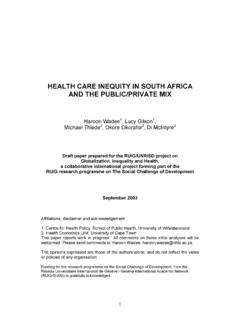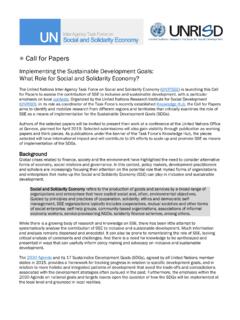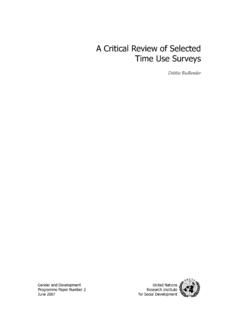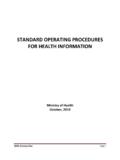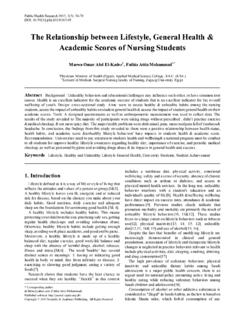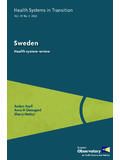Transcription of Constraints on Universal Health Care in the Russian …
1 Working Paper 2015-5 Constraints on Universal Health care in the Russian Federation Inequality, Informality and the Failures of Mandatory Health Insurance Reforms Linda Cook pr epared for the UNRISD project Toward Universal Social Security in Emerging Economies February 2015 UNRISD Working Papers are posted online to stimulate discussion and critical comment. The United Nations Research Institute for Social Development (UNRISD) is an autonomous research institute within the UN system that undertakes multidisciplinary research and policy analysis on the social dimensions of contemporary development issues. Through our work we aim to ensure that social equity, inclusion and justice are central to development thinking, policy and practice.
2 UNRISD, Palais des Nations 1211 Geneva 10, Switzerland Tel: +41 (0)22 9173020 Fax: +41 (0)22 9170650 Copyright United Nations Research Institute for Social Development This is not a formal UNRISD publication. The responsibility for opinions expressed in signed studies rests solely with their author(s), and availability on the UNRISD Web site ( ) does not constitute an endorsement by UNRISD of the opinions expressed in them. No publication or distribution of these papers is permitted without the prior authorization of the author(s), except for personal use. i Contents Acronyms .. ii Abstract .. iii Introduction .. 1 Legacies of the Soviet-Era Health care System .. 3 The decline and reform of Health care in the 1990s.
3 5 Spontaneous privatization and shadow commercialization .. 7 2000 2010: Putin, Progress and Persistent Problems .. 9 Russia s Contemporary Health care System: Institutions, Actors, Processes .. 10 Financing and administration .. 11 The Guaranteed Package of Health care .. 12 Obstacles to Universal Access and Drivers of Fragmentation in Russia s Health Sector .. 13 Inequality .. 13 Social exclusion: Unregistered migrants .. 16 Stigmatized groups .. 17 Assessing Russia s Health System: Performance and Outcomes .. 18 Policy Recommendations .. 20 Conclusion .. 21 References .. 22 ii Acronyms AIDS Acquired Immunodeficiency Syndrome ARV Antiretroviral EU European Union FIDH International Federation for Human Rights GATM Global Fund to Fight AIDS.
4 Tuberculosis and Malaria GDP Gross Domestic Product HIO Health Insurance Organization HIV Human Immunodeficiency Virus I/NGO International/Non-governmental Organization IDU Intravenous Drug User IFI International Financial Institution IOM International Organization for Migration MDR TB Multi-Drug Resistant Tuberculosis MHI Mandatory Health Insurance NOBUS National Survey on Public Well-Being and Engagement with Social Programs NPPH National Priority Project on Health OECD Organisation for Economic Co-operation and Development RLMS Russian Longitudinal Monitoring Survey STD Sexually Transmitted Disease TB Tuberculosis UNRISD United Nations Research Institute for Social Development VHI Voluntary Health Insurance WHO World Health Organization iii Abstract Healthcare in Russia has gone through many transformative stages, from a Soviet-era model of public provision to an emphasis on privatization under economic liberalization during the 1990s.
5 Both have legacies that survive to the present, and now a mix of both public and private healthcare provision operates across Russia. Throughout all these periods, universalism has been enshrined as a guarantee, at least nominally. The extent to which this right has been upheld varies greatly, with some major Constraints to Universal provision in Russia. Underfinancing presents a persistent obstacle to Universal access, and substantial inequalities in healthcare access and quality exist across different regions and income groups, with some vulnerable and marginalized groups left almost entirely excluded. Furthermore, despite efforts to improve quality and provision of healthcare, Russia has a poor record in many Health indicators, and its national system is struggling to become more efficient and effective.
6 Linda Cook is Professor and Chair at the Department of Political Science at Brown University, United States. 1 Introduction The Russian Federation inherited from its Soviet predecessor a Universal system of basic Health care that was state run and free at point of access. The Soviet state established this system during the 1930s and 1940s as part of rapid modernization and industrialization. For several decades the system produced significant improvements in key Health indicators: life expectancy increased, infant mortality declined and infectious diseases were brought under control. It was reasonably effective in implementing broad public Health measures and controlling communicable diseases, but could not adapt to treat more complex non-communicable conditions such as cancer and cardiovascular diseases.
7 By the 1980s accumulating problems of bureaucratic rigidity, low levels of medical technology, underfinancing and failed reform efforts were contributing to the deterioration of Health conditions among Russia s population. With the collapse of the Soviet Union in 1991 Russia s statist political economy imploded, and its Health care system was thrown into crisis. During the 1990s the Health sector was buffeted by Russia s decade-long economic decline and radical efforts to transform Health care provision according to a liberal, market-based insurance model. Public expenditures on Health declined dramatically. President Yeltsin s poorly designed reforms introducing Health care de-statization, privatization and marketization led to political conflict and disorganization that worsened dysfunction.
8 By the late 1990s key Health indicators had declined dramatically. Famously, male life expectancy in Russia declined to below 60 years, a level not otherwise seen in peacetime developed economies. Russia began a sustained demographic decline. From 1993 to 2005 the number of deaths exceeded births by million, and the population was declining by about 700,000 per year (Putin, 2005). While deficient Health care was certainly not the only cause here, it is broadly seen as a contributing factor. Infectious diseases re-emerged and spread, and even childhood immunization programmes collapsed temporarily in parts of the Russian Federation. The worst effects on Health indicators had been largely reversed by 2010, and the formal guarantee of Universal rights to Health care was retained throughout.
9 However, the decade of crisis in the 1990s produced changes in income distribution and Health care practices that have persisted as major Constraints on Universal access. High levels of inequality in Russian society have created an underclass of low-income strata, especially rural populations and urban migrant workers, who have little access to medical services. Processes of spontaneous privatization and shadow commercialization within the Health sector have raised barriers to Health care , and ubiquitous practices of informal payments persist as obstacles that exclude or restrict access. During the decade 2000 2010 the Russian Health care system recovered substantially in terms of financing, performance, organizational coherence and Health outcomes.
10 Rapid growth of Russia s economy from 2000 to 2007 provided resources to restore and increase Health expenditures, while the Putin administration broadly revived the state s administrative capacities, including in the Health sector. Public expenditure recovered, increasing as the economy grew, though the proportion of the growing gross domestic product (GDP) expended for Health care remained modest. In mid-decade the Putin administration, responding to the demographic crisis, made Health care a major policy priority. Administration of the Health care system was partially recentralized at the federal level, a pro-natalist campaign was launched and the National Priority Project on Health (NPPH) showcased the political elite s concerns.
